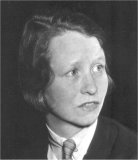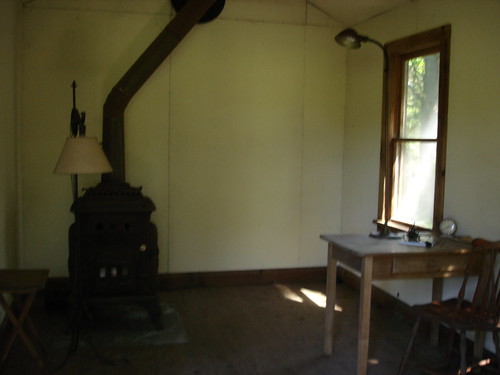(...) Edna St. Vincent Millay (22 de febrero de 1892 – 19 de octubre de 1950) fue una poetisa lírica y dramaturga estadounidense y la primera mujer en recibir el Premio Pulitzer por poesía. También se la conoce por su estilo de vida bohemio y sus numerosas relaciones amorosas. Usaba el pseudónimo Nancy Boyd para su trabajo en prosa.
Millay nació en Rockland, Maine de Cora Lounella Buzzell, una enfermera, and Henry Tollman Millay, un profesor de escuela que más tarde se convertiría en director. Su segundo nombre deriva de el Hospital de St. Vincent's en Nueva York, donde la vida de su tio había sido salvada justo antes de su nacimiento. (...)
 (...) La primera mujer que recibió el Premio Pulitzer de Poesía fue Edna St. Vincent Millay, una de las poetas estadounidenses más fascinantes de la primera mitad del siglo pasado. La amé con pasión ilimitada tras leer su biografía publicada en el 2001, “Savage Beauty: The Life of Edna St. Vincent Millay”.
(...) La primera mujer que recibió el Premio Pulitzer de Poesía fue Edna St. Vincent Millay, una de las poetas estadounidenses más fascinantes de la primera mitad del siglo pasado. La amé con pasión ilimitada tras leer su biografía publicada en el 2001, “Savage Beauty: The Life of Edna St. Vincent Millay”. Su infancia transcurrió de pueblo en pueblo, junto a su madre divorciada y 2 hermanas, viviendo de la caridad de parientes y amigos adinerados. Luego la familia se radicó en Camden, Maine –estado natal de Edna- en una modesta casa en la propiedad de una tía abuela. Fue una infancia de carencias materiales; sin embargo, rica en imaginación y retos. Cora, la madre, siempre viajó con sus libros de Shakespeare o John Milton, con los cuales alimentó el espíritu de sus tres hijas.
 En una lectura de
poesía, una mujer adinerada llamada Caroline B. Dow escuchó a la joven poeta y quedó tan
impresionada que le ofreció pagarle los estudios superiores. Así fue que Edna
Millay se educó en Vassar College. Después de su graduación, en 1917,
se mudó a la Ciudad de New York, donde vivió una vida bohemia compartiendo con
los pintores, escritores y poetas en pleno desarrollo, y con los ya establecidos
y de moda. De 1923 a 1924 vivió en el edificio que aparece a la izquierda,
ubicado en el Greenwich Village, el cual tiene la tarja que muestro al inicio de
este post. Fue la época en que ella ganó el Pulitzer con su libro
“The Harp-Weaver, and Other Poems”.
En una lectura de
poesía, una mujer adinerada llamada Caroline B. Dow escuchó a la joven poeta y quedó tan
impresionada que le ofreció pagarle los estudios superiores. Así fue que Edna
Millay se educó en Vassar College. Después de su graduación, en 1917,
se mudó a la Ciudad de New York, donde vivió una vida bohemia compartiendo con
los pintores, escritores y poetas en pleno desarrollo, y con los ya establecidos
y de moda. De 1923 a 1924 vivió en el edificio que aparece a la izquierda,
ubicado en el Greenwich Village, el cual tiene la tarja que muestro al inicio de
este post. Fue la época en que ella ganó el Pulitzer con su libro
“The Harp-Weaver, and Other Poems”.Edna fue una mujer de grandes pasiones. Amó a hombres y mujeres con la misma intensidad, y se sabe que su matrimonio con Eugene Jan Boissevain en 1923 fue una relación abierta y de entendimientos mutuos. El era un hombre de 43 años que la apoyó en su trabajo creativo y consintió en sus, para la época, extravagancias. La pareja vivió en la finca Steepletop en Austerlitz, New York, donde recibían amigos por temporadas. Edna le sobrevivió cuando él murió de cáncer en los pulmones, falleciendo ella un año después.


(Susan Spano / For The Times)

 |
| Cabin at Steepletop, Austerlitz, NY, USA, the home of poet Edna St. Vincent Millay in the later years of her life. Used by Millay as a writing stud) |
 |
| Edna St. Vincent Millay ( Associated Press ) Millay in 1937. |
The Gardener in Haying Time
Collected Poems (1956).
I had a gardener. I had him until haying-time.
In haying-time they set him pitching hay.
I had two gardeners. I had them until haying-time.
In haying-time they set them pitching hay.
I had three gardeners. I had them until haying-time.
---Can life go on this way?
He olvidado qué labios me han besado
He olvidado qué labios me han besado,
dónde y por qué, en qué brazos he dormido
hasta el amanecer; pero en el ruido
de la lluvia esta noche han llamado,
mi corazón dulcemente ha sufrido
por los tiernos muchachos que yo olvido
y que ya no despiertan a mi lado.
Ashes of Life
Love has gone and left me and the days are all alike;
Eat I must, and sleep I will, -- and would that night were here!
But ah! -- to lie awake and hear the slow hours strike!
Would that it were day again! -- with twilight near!
Love has gone and left me and I don't know what to do;
This or that or what you will is all the same to me;
But all the things that I begin I leave before I'm through, --
There's little use in anything as far as I can see.
Love has gone and left me, -- and the neighbors knock and borrow,
And life goes on forever like the gnawing of a mouse, --
And to-morrow and to-morrow and to-morrow and to-morrow
There's this little street and this little house.
http://vcencyclopedia.vassar.edu/alumni/edna-st-vincent-millay.html
http://www.millay.org/2011/05/18/millays-steepletop-gallery-to-open-for-second-season/
http://www.everypoet.com/archive/poetry/Edna_St_Vincent_Millay/edna_st_vincent_millay_ashes_of_life.htm








1 comentario:
bella poesía la Naturaleza en Norteamérica es impresionanate. Bonito blog.
Traduzco a esta poetisa.
Publicar un comentario